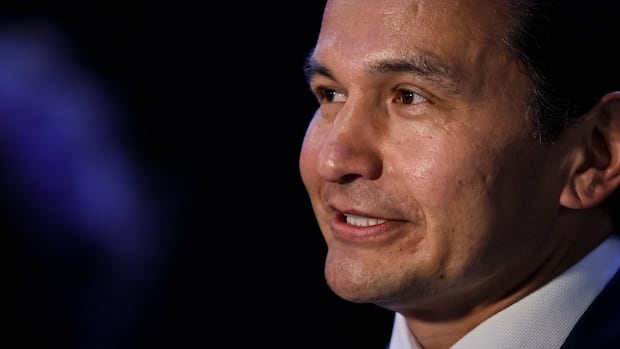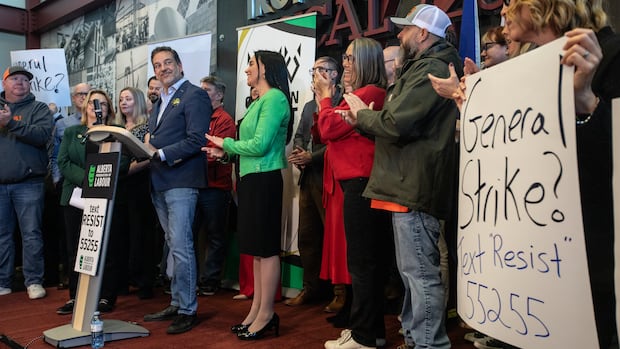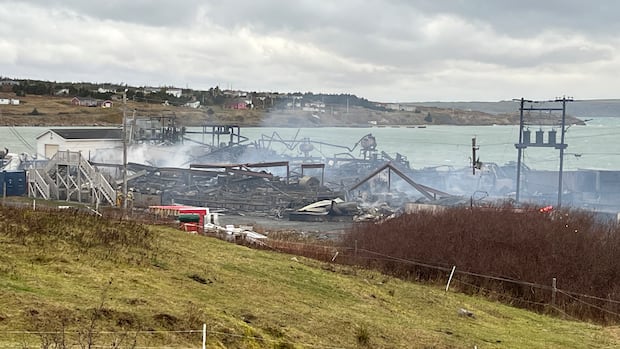Manitoba’s premier is questioning the federal government’s decision to drop most counter-tariffs against the United States, saying he doesn’t want the prime minister to start taking an “elbows down” approach.
Premier Wab Kinew told CBC News in a phone interview Friday it’s not the right time for Canada to lift the tariffs.
“I’m not a fan of this move. Is this ‘elbows down?’ Think Canadians want to see a stronger response to Donald Trump,” Kinew said.
“I think Canadians want us to fight for this country that we love so much,” he said. “This doesn’t seem to match the moment.”
Prime Minister Mark Carney announced on Friday the country will be lifting the retaliatory duties by Sept. 1, saying he received reassurances from U.S. President Donald Trump that removing tariffs on U.S. imports that are covered by the Canada-U.S.-Mexico Agreement (CUSMA) would boost talks on other trade issues.
Carney said tariffs on steel, aluminum and autos will remain as both governments continue negotiations.
Kinew said he didn’t have a call scheduled with the prime minister to discuss the decision and that the province only learned about it after it was announced.
The premier said he would instead like to see the federal government remove tariffs on Chinese electric vehicles so that country would drop its duties on canola, “if we’re in the business of removing tariffs.”
Last month, the Trump administration raised tariffs on Canadian goods from 25 to 35 per cent, using fentanyl trafficking and the Canadian government’s “continued inaction and retaliation” over the issue to justify the hike.
Goods covered by CUSMA have remained exempt from the U.S. tariffs.
Chambers of Commerce hopes decision leads to deal
Some Manitoba business groups were more supportive of the federal government’s latest move.
Chuck Davidson, president and CEO of the Manitoba Chambers of Commerce, said he hopes the decision moves negotiations with the U.S. forward.
“The reality is 80 to 85 per cent of all goods traded with the U.S. [are] CUSMA-compliant, and so it’s business as usual,” he said.
“I think what taking those reciprocal tariffs off has done is it sent a bit of a message to the U.S. government and to President Trump that we’re interested in working on a deal.”
About 75 per cent of Manitoba’s imports came from the U.S. as of 2025, according to the province’s Bureau of Statistics. That represents $6.26 billion worth of goods.
Barb Miller, president of Otimo Customs Inc. — a supply chain compliance specialist based in Winnipeg — said the people paying for the duties were typically not the exporters or manufacturers, but Canadian distributors.
“I think anybody importing U.S.-origin goods are going to support it,” she said.
“The beauty industry in particular [will be] super-happy…. A lot of produce like the watermelons and oranges and all that, people will be super-happy by that because it qualifies for CUSMA. So you’re going to see the cost of food get better.”
Manufacturers association cautiously optimistic
Manitoba’s exports to the U.S fell by 3.4 per cent in the first quarter of 2025, according to the Bureau of Statistics. The country represents 70.8 per cent of the province’s total exports.
Dennis Darby, president and CEO of Canadian Manufacturers and Exporters, said he’s supportive of lifting the tariffs as long as it leads to a resolution between both countries.
“We really hope that this move by Canada won’t ultimately get met with no positive change,” he said.
“Canada, for example, dropped its digital services tax back in July, also in an effort to try to get a deal. The only real change has been that the U.S. has increased tariffs on Canadian goods.”







